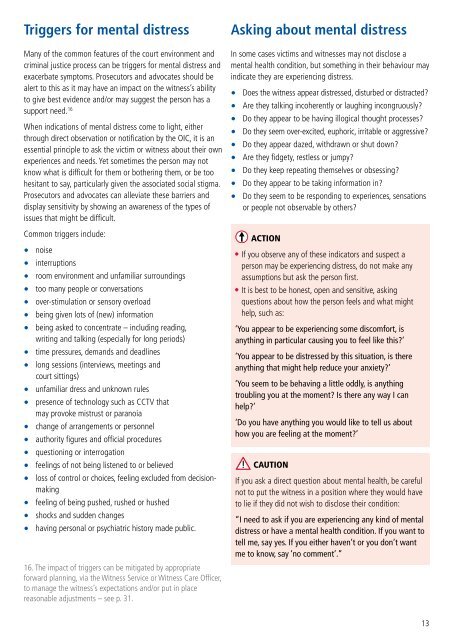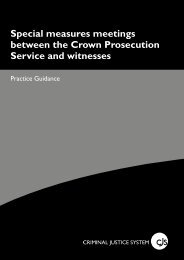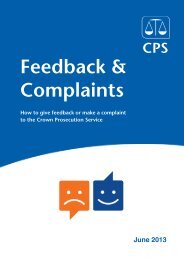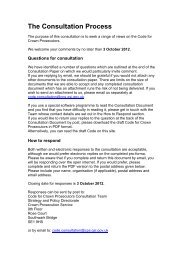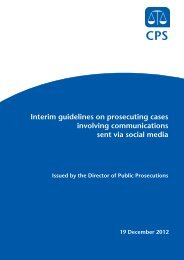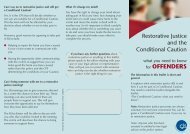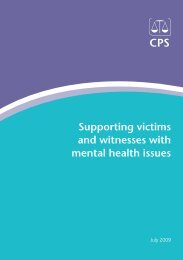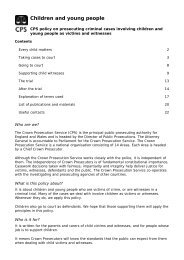Achieving justice for victims and witnesses with mental distress
Achieving justice for victims and witnesses with mental distress
Achieving justice for victims and witnesses with mental distress
You also want an ePaper? Increase the reach of your titles
YUMPU automatically turns print PDFs into web optimized ePapers that Google loves.
Triggers <strong>for</strong> <strong>mental</strong> <strong>distress</strong>Many of the common features of the court environment <strong>and</strong>criminal <strong>justice</strong> process can be triggers <strong>for</strong> <strong>mental</strong> <strong>distress</strong> <strong>and</strong>exacerbate symptoms. Prosecutors <strong>and</strong> advocates should bealert to this as it may have an impact on the witness’s abilityto give best evidence <strong>and</strong>/or may suggest the person has asupport need. 16When indications of <strong>mental</strong> <strong>distress</strong> come to light, eitherthrough direct observation or notification by the OIC, it is anessential principle to ask the victim or witness about their ownexperiences <strong>and</strong> needs. Yet sometimes the person may notknow what is difficult <strong>for</strong> them or bothering them, or be toohesitant to say, particularly given the associated social stigma.Prosecutors <strong>and</strong> advocates can alleviate these barriers <strong>and</strong>display sensitivity by showing an awareness of the types ofissues that might be difficult.Common triggers include:• noise• interruptions• room environment <strong>and</strong> unfamiliar surroundings• too many people or conversations• over-stimulation or sensory overload• being given lots of (new) in<strong>for</strong>mation• being asked to concentrate – including reading,writing <strong>and</strong> talking (especially <strong>for</strong> long periods)• time pressures, dem<strong>and</strong>s <strong>and</strong> deadlines• long sessions (interviews, meetings <strong>and</strong>court sittings)• unfamiliar dress <strong>and</strong> unknown rules• presence of technology such as CCTV thatmay provoke mistrust or paranoia• change of arrangements or personnel• authority figures <strong>and</strong> official procedures• questioning or interrogation• feelings of not being listened to or believed• loss of control or choices, feeling excluded from decisionmaking• feeling of being pushed, rushed or hushed• shocks <strong>and</strong> sudden changes• having personal or psychiatric history made public.16. The impact of triggers can be mitigated by appropriate<strong>for</strong>ward planning, via the Witness Service or Witness Care Officer,to manage the witness’s expectations <strong>and</strong>/or put in placereasonable adjustments – see p. 31.Asking about <strong>mental</strong> <strong>distress</strong>In some cases <strong>victims</strong> <strong>and</strong> <strong>witnesses</strong> may not disclose a<strong>mental</strong> health condition, but something in their behaviour mayindicate they are experiencing <strong>distress</strong>.• Does the witness appear <strong>distress</strong>ed, disturbed or distracted?• Are they talking incoherently or laughing incongruously?• Do they appear to be having illogical thought processes?• Do they seem over-excited, euphoric, irritable or aggressive?• Do they appear dazed, <strong>with</strong>drawn or shut down?• Are they fidgety, restless or jumpy?• Do they keep repeating themselves or obsessing?• Do they appear to be taking in<strong>for</strong>mation in?• Do they seem to be responding to experiences, sensationsor people not observable by others?Action• If you observe any of these indicators <strong>and</strong> suspect aperson may be experiencing <strong>distress</strong>, do not make anyassumptions but ask the person first.• It is best to be honest, open <strong>and</strong> sensitive, askingquestions about how the person feels <strong>and</strong> what mighthelp, such as:‘You appear to be experiencing some discom<strong>for</strong>t, isanything in particular causing you to feel like this?’‘You appear to be <strong>distress</strong>ed by this situation, is thereanything that might help reduce your anxiety?’‘You seem to be behaving a little oddly, is anythingtroubling you at the moment? Is there any way I canhelp?’‘Do you have anything you would like to tell us abouthow you are feeling at the moment?’CAUTIONIf you ask a direct question about <strong>mental</strong> health, be carefulnot to put the witness in a position where they would haveto lie if they did not wish to disclose their condition:“I need to ask if you are experiencing any kind of <strong>mental</strong><strong>distress</strong> or have a <strong>mental</strong> health condition. If you want totell me, say yes. If you either haven’t or you don’t wantme to know, say ‘no comment’.”13


